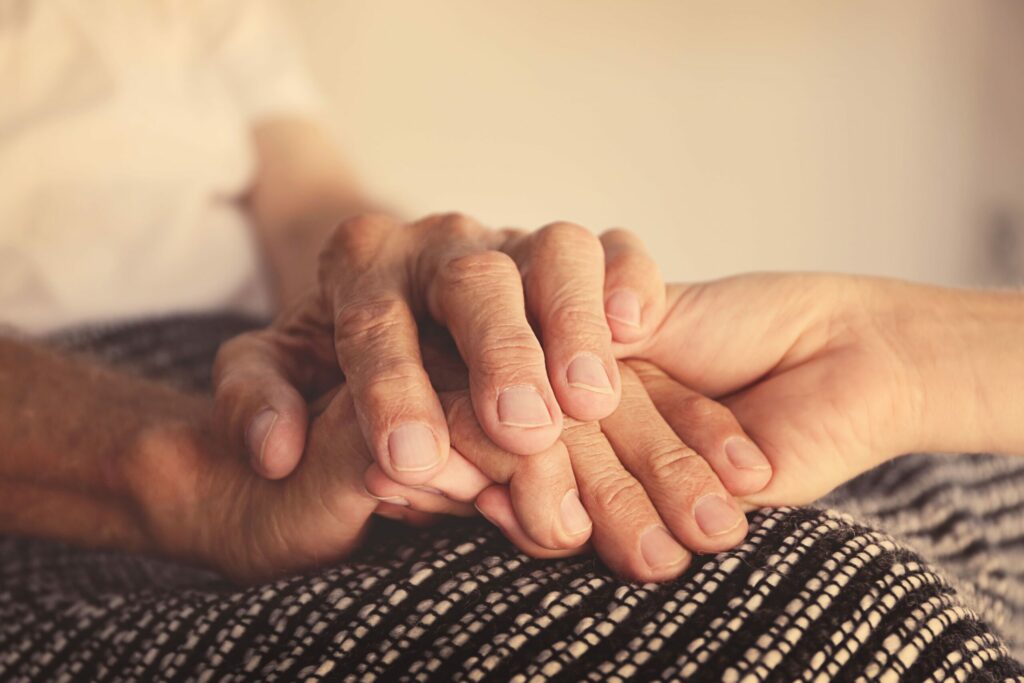© 2024 Springhill Home Health & Hospice
All Rights Reserved
All Rights Reserved
When it comes to dealing with grief, there’s no one-size-fits-all approach. Everyone grieves differently, and grief can affect individuals, families, and a person’s entire social circle. The grieving process can be especially complicated for those who are homebound or on hospice with a terminal illness.
Creating a plan of care for home care or hospice patients must also incorporate grief. By including grief in an individual’s plan of care, we are able to meet the holistic needs of patients and support them throughout the process.
Home health services allow patients to comfortably remain living in their homes with the support of exceptional medical professionals. However, individuals with chronic conditions or recovering from an illness may also experience grief, especially during the early stages of adjusting to a new life.
Patients may grieve the loss of the life they once knew, which comes with a set of new emotions to tackle. After an injury, illness, or surgery, it can be difficult for patients to adjust to changes in abilities and personal freedoms/independence.

As we develop a plan of care for individuals receiving home health care, it is vital to consider this grieving process. By acknowledging this grieving process, home health professionals can actively support healing and find supportive ways to improve the mental wellness of these patients. It is important to remember that healing looks different for every patient, and no timeline can be associated with processing grief.
Hospice care is focused on supporting patients with terminal illnesses to be as comfortable and pain-free as possible. When an individual is put on hospice, grief can occur both personally and for family members. Many families of patients experience anticipatory grief before an impending loss. This type of grief can cause individuals to feel many unexpected emotions: fear, sadness, loneliness, anger, and more.
Coping with grief can look different for every patient and family member. What brings one person comfort may not help another.
Creating a personalized hospice care plan is one of the ways our hospice team can help support individuals and their families experiencing grief. From providing emotional support to additional resources, there are many ways hospice care can support grieving individuals.

To take things a step further, we offer a helpful bereavement program, which can support families during a difficult time in their lives. We provide one-on-one support, supportive phone calls and in-home support sessions to help each individual manage the grieving process and begin their healing process.
Whether you’re grieving a change in abilities or the loss of a loved one, each person’s grieving process is entirely unique. We incorporate grief into the plan of care for both home health and hospice patients. To learn more, contact us anytime to learn more about how our home health and hospice care can help support you and your loved ones through any stage of grief.
We don’t often think about the importance of staying hydrated. We may go for hours and hours without a sip. We may wait until we’re thirsty to get a drink.
Generally, you should drink ⅓ of your weight (in pounds) in ounces of water daily. For example, if you weigh 150 pounds, drink 50 ounces of water (or other hydrating beverages) daily.
Many health problems and medications can affect the amount of water we need, so it’s best to talk with your doctor about your specific needs.

As we get older, our ability to regulate the amount of water in our body declines. What’s more, our lifestyle and habits may change over time. We may have been more active, naturally drinking more water. But now we don’t exercise as much or at high intensity.
We may have commuted to work every day with a drink in the cup holder. We sat at our desks with a tumbler of water within reach, a constant reminder to take a drink.
For seniors, we need to maintain a 55% level of water in our bodies. Dehydration, even in mild cases, can harm health and exacerbate existing medical conditions. Symptoms like confusion, dizziness, fatigue, joint pain and constipation can result from inadequate hydration.
The importance of staying hydrated extends beyond everyday life for seniors. It becomes even more critical when recovering from an illness, injury, or medical procedure. During these times, the body requires additional support to heal and regain strength and adequate hydration plays a vital role.
Some of the ways hydration helps you heal include:

Many of us take multiple medications, some of which may cause an increase in urination. What’s more, many chronic health conditions, like diabetes and kidney disease, can contribute to this loss of fluids. Losing too much fluid is even more dangerous in summer.
During the hotter months, the combination of higher temperatures and perspiration can lead to a greater risk of dehydration. Heat-related illnesses like heat exhaustion and heat stroke are also more common in seniors and can be life-threatening.
Look for shade, go into an air-conditioned building, and avoid prolonged exposure to heat and sun when temperatures and humidity rise.
Drinking enough water isn’t the only way to prevent dehydration. Other hydrating beverages and foods are also options.
Foods like fruits and vegetables with high water content can help also us stay hydrated: strawberries, tomatoes, watermelon, celery, and cucumbers. Beverages like herbal teas can increase hydration too. But it’s essential to limit caffeine and alcohol. They can have a diuretic effect.
Remember that staying hydrated is important at any age but is critical for seniors. Staying hydrated gives our bodies the necessary support to heal, manage medications, boost immune function and regain energy and mobility. Be sure to talk with your doctor about their hydration recommendations for your needs.
References:
https://www.ncbi.nlm.nih.gov/pmc/articles/PMC2908954/
https://www.ncoa.org/article/how-to-stay-hydrated-for-better-health
Watching someone you love suffer from Alzheimer’s or another memory debilitating illness is incredibly difficult, and it can be even more challenging to decide when it’s time to consider hospice care. Here, we are sharing five signs it may be the right time to consider the extra support of hospice care for an Alzheimer’s patient.
The Functional Assessment Staging (FAST) Scale is a tool used to determine if changes in a patient’s condition are related to Alzheimer’s disease or another condition. If due to Alzheimer’s, the changes will occur in sequential order. Alzheimer’s disease-related changes do not skip FAST stages.

This means a person is no longer able to get around on their own. For example, they require assistance getting from room to room.
Without assistance, you may notice they put their shoes on the wrong feet or their day-time ‘street’ clothes on over their pajamas. They are also unable to bathe without assistance.
This includes urinary or fecal incontinence or both.
This may begin as the patient only saying 5-6 words per day and gradually reduce to only speaking one word clearly until they can no longer speak or communicate at all. This will also include the inability to smile.

Hospice care is for patients with a life limiting illness and a life expectancy of six months or less. The main focus is to manage pain and symptoms and ultimately keep the patient comfortable. When you choose hospice for your loved one, their care team can help you to understand what to expect in the final stages of Alzheimer’s. They will also provide support to you and the rest of your family throughout the end-of-life process.
If you would like more information on hospice care for Alzheimer’s patients, please contact us. We are here to answer any questions you may have.
In the United States, one in five adults will experience a mental illness in any given year. This includes a large number of people who are living with a terminal illness—and their caregivers—who must cope with facing the end of life and making the necessary arrangements.
May is Mental Health Awareness Month. As one of the country’s leading hospice providers, our team is devoted to connecting you with the care you need if you are living with a mental illness.

Mental Health Awareness Month was established in 1949 by Mental Health America. The goal of this observance is to help Americans understand the importance of achieving good mental health and to empower people with mental health issues to seek treatment. Mental Health Awareness Month is an opportune time to learn about the causes, symptoms, and treatments of various mental health disorders.
This year’s theme for Mental Health Awareness Month is “Look Around, Look Within.” It calls for Americans to focus on how one’s surroundings can impact their mental health. Specific topics that align with this year’s theme include:
If you can identify specific factors that may be impacting your mental health, it’s time to make changes to your surroundings that can get you on the path to feeling better. For example, if you have a serious, debilitating health condition affecting your ability to carry out normal everyday tasks, it may be time to seek assistance from a home health care provider.
Caring for your mental health is just as important as caring for your physical health. Experiencing mental health symptoms like sadness, depression, anxiety, and stress every day for a long period can affect your career, relationships, social life, and general well-being. An untreated mental illness can also increase your risk for a wide range of physical health problems including diabetes, stroke, and heart disease.
Unfortunately, stigma continues to surround mental illness and prevents many people with mental health problems from seeking the help they need to become healthier and improve their quality of life.
Mental health treatment can help you identify the factors in your life that are causing your symptoms and empower you to make changes that can reduce their impact on your mental well-being. If you are living with a terminal illness, seeking mental health treatment is especially important given how terminal illness places you at higher risk for anxiety and depression.

Having a terminal illness—such as cancer—is one of the top risk factors associated with mental illness. If you have a terminal illness or are caring for someone with a terminal illness, you may need help coping with certain treatments and with facing the end of life.
We offer hospice services that are personalized for every patient based on their mental, physical, spiritual, and emotional health needs—including mental health treatment. Counseling, bereavement, and support group therapy are some of the many mental health services offered by our hospice care providers. Our interdisciplinary teams are comprised of compassionate physicians, nurses, social workers, chaplains, and others who are dedicated to helping you and your loved ones navigate a terminal illness while caring for your mental health.
If you are suffering from a mental health issue, don’t hesitate to speak up and come to us with your concerns. We will be more than happy to connect you with the help and treatment you need and guide you and your loved ones toward finding the right treatments that can improve your quality of life.
Contact us today to speak with one of our representatives and learn more about our hospice and mental health services.
This May, join us in celebration of America’s 4.4 million registered nurses who make a touching difference in the lives of patients and their families. Exceptional nurses often have a true passion for helping others, backed by compassion and empathy.
In honor of this month, we express our appreciation for home health nurses, hospice nurses, and nurses who work in the skilled nursing facilities that partner with us as hospice and home health providers.
Nurses make a profound impact in improving the quality of life of individuals in skilled nursing facilities, hospice care, and home health care. We invite social workers, medical professionals, and anyone who has been touched by a nurse to celebrate Nurse Appreciation Month with us. This is your reminder to thank your nurses and show you appreciate their “special touch”.

Nurses working in skilled nursing facilities serve a vital role in helping individuals get back on their feet after an injury or illness. While in rehabilitative nursing care, patients are supported by nurses who are committed to helping them improve their quality of life and regain strength during recovery.
Often, it is because of the support from nurses in rehabilitative nursing care that individuals can safely return to their homes for ongoing support from home health nurses. This allows individuals to continue recovering from the comfort of their own homes.
Throughout the month of May, we also recognize and show we appreciate the exceptional home health nurses that support patients in their homes. Home health nurses play a vital role in supporting an individual’s road to recovery as they strive to regain independence and autonomy in the home. Home health staff support the holistic health of individuals beyond physical care by also providing social and emotional support.
Hospice nurses have a special role in the lives of patients diagnosed with a terminal illness and their families. Nurses providing end-of-life care through hospice services help reduce unnecessary pain and suffering, making individuals as comfortable as possible in their final months or days of life. In addition, hospice nurses generously share their skills and compassion to provide supportive care that improves an individual’s quality of life, developing strong bonds with patients and their families.

Often, hospice nurses go above and beyond the call of duty, showing exceptional compassion for those nearing the end of their life. Not only do hospice nurses support an individual’s wishes, but they also provide support resources for family and friends during difficult times. Most families never forget the lasting impact the nurses made during an incredibly challenging period in their life.
Nurses in skilled nursing facilities, hospice care, and home health nurses demonstrate admirable qualities such as compassion, patience, and empathy. On behalf of our team and our partners, we honor the champions that have dedicated their careers to improving the lives of others. We couldn’t do it without you!
Springhill Home Health Branch Manager, Sherri Wendell, has been Working Smart and Doing Good in Mobile, Alabama.

Sherri won BrightSpring’s 2023 LEGACY Leadership Award. Over the past two years, Sherri has demonstrated effective leadership capabilities as she and her team have worked very hard to improve their CMS star rating. Through implementation of daily exit calls, educatoinal sessions, monthly clinical scorecard reviews, and setting clear expectations and ongoing monitoring, they have moved this rating from a 2 to a 4.5.
Sherri also led Mobile to a high census growth in 2022. The branch ended 2021 with a census of 140 at 64% episodic census. Last year, they were able to bolster that census to 211 patients with a 65% episodic mix. While maintaining this growth and boosting their star ratings, Sherri also ensured their quality scores to and stayed within the top 20% for patient satisfaction.
Thank you, Sherri, for you commitmen to the well-rounded Leadership that has allowed you to help more people live their best life. Congratulations!
Some older adults and people with serious illnesses, unfortunately, experience the end of life in certain healthcare settings that do not align with their desired wishes. If you have a serious illness or are a caregiver of someone planning end-of-life care, knowing the difference between palliative care and hospice care can help you make an informed decision when the time comes to transition to one of these healthcare settings.
Palliative care is a form of care that focuses on improving your quality of life and that of your family when you are living with a serious illness. It focuses on your whole-person health rather than only on your condition. If you are receiving palliative care, your treatment plan may focus on reducing symptoms of your illness and on improving secondary conditions such as depression, sleep deprivation, and side effects of medications.
Palliative care may be given in various healthcare settings, such as at the hospital, a residential care facility, or your home. Anyone can receive this type of care regardless of age or the severity of their condition.
If you receive palliative care, you may work with and be treated by various healthcare professionals, including doctors, nurses, social workers, pharmacists, physical therapists, counselors, and nutritionists. If you need spiritual care, your palliative care team may even include a chaplain. The healthcare professionals that make up your palliative care team will depend mainly on your recovery needs and level of care.
Studies show that palliative care offers many benefits, including:

Hospice care focuses on improving your comfort and quality of life when you are nearing the end of your life. This type of care is usually given in circumstances in which an illness continues to progress despite treatment or when the patient chooses not to receive certain treatments. Hospice care is similar to palliative care in that it provides comfort care and support for the family. However, treatments are not given to improve the illness.
Like palliative care, hospice care can be given in many different healthcare settings, though it is most frequently given at your home, where you can be most comfortable and spend quality time with your loved ones. In addition, it is typically given when your healthcare provider believes you have no more than six months to live. Some benefits of hospice care include 24/7 access to nurses and healthcare workers who can address and relieve symptoms and side effects and access to medical equipment and medications that can reduce your discomfort.
Many of the same types of healthcare professionals that make up a palliative care team will also be part of your hospice care team. This includes doctors, nurses, social workers, chaplains, and volunteers who dedicate their time to giving you the support you need and making you feel as comfortable as possible during your final months.
To be eligible for hospice care, you will discontinue aggressive treatment efforts to combat your terminal illness (such as experimental surgeries, aggressive chemotherapy, or other treatments that require prolonged hospitalization and recovery). However, you may continue to receive treatments for other conditions, such as antidepressants to treat depression or insulin medicines to control Diabetes.
Comfort care and end-of-life care are both terms that describe the type of care you receive when you are near the end of your life and are no longer receiving treatment for your illness. It is highly similar to palliative care in providing you with whole-person care that focuses on your physical, social, emotional, and spiritual health. Comfort care and end-of-life care may include palliative care or hospice care, or a combination of both.
Sometimes, palliative care is given as part of hospice care, and both types share many similarities. For instance, the goal of both palliative and hospice care is to improve your quality of life and help you find relief from painful and severe symptoms and side effects of treatment. Both types of care also focus on whole-person health. However, there remain many differences between palliative care and hospice care.
Some of these differences are:

You may want to consider palliative care if you or your loved one has a serious illness or chronic condition that requires long, intensive care or that causes severe physical symptoms and/or emotional distress. For example, cancer, heart disease, AIDS, and kidney failure are some of the many conditions that can benefit from palliative care.
Additionally, palliative care may benefit you if you:
A person may transition from palliative care to hospice care if their doctor thinks they have no longer than six months to live. Sometimes, it can be difficult for doctors to predict exactly how long it will take for a particular disease to run its course or how long a person has left to live if their health is in decline. In these circumstances, it’s important to consider how transitioning to hospice care could improve your quality of life during your final months.
According to the National Library of Medicine (NLM), doctors should strongly consider referring chronically ill patients to hospice care if they spend more than half their time in bed, are unable to function efficiently, and are experiencing both physical and psychological distress. The NLM adds that hospice referrals are usually necessary when the patient’s condition has progressively declined to the point that their highest priority is to take control of their healthcare and achieve the greatest possible comfort in their homes as they near the end of life.
Talk to your doctor if you think you may need hospice care but aren’t sure when you should transition out of palliative care. Your doctor can talk to you at length about your options and the benefits of transitioning to hospice care based on your condition and unique circumstances.
Taking advantage of hospice care as soon as it’s needed could result in access to quality care and lots of extra quality time to spend with your loved ones. Additionally, studies show that patients who plan their care in advance are more likely to be satisfied with their care, given how they can make decisions that align with their end-of-life wishes.
Consult with your healthcare provider if you or your loved one is interested in learning more about palliative care or hospice care. Your doctor can refer you to a palliative or hospice care specialist who can answer all your questions and help you determine which of these services may be more ideal.
Palliative care and hospice care are covered by many major health insurance providers, including Medicare. The exact benefits covered will vary based on your health plan. Benefits covered may include medical equipment and supplies, skilled nursing care, bereavement support, and medications to provide comfort, among many others.
Hospice At Your Side has resources for home health and hospice services throughout the United States. Specialty services we offer include diabetes care, orthopedics, and pain management. Call us today to learn more about our many home healthcare services.

Springhill Hospice has been recognized by Strategic Healthcare Programs (SHP) as a “Premier Performer” for achieving an overall caregiver and family satisfaction score that ranked in the top 5% of all eligible SHP clients for the 2021 calendar year.
The annual SHPBest™ award program was created to acknowledge hospice providers that consistently provide high quality service to families and caregivers of patients receiving hospice care. The 2021 award recipients were determined by reviewing and ranking the overall CAHPS Hospice survey satisfaction score for more than 1,000 hospice providers. With one of the largest CAHPS Hospice benchmarks in the nation, SHP is in a unique position to identify and recognize organizations that have made family and caregiver satisfaction a priority and have been rewarded for their efforts with high marks on the CAHPS Hospice survey.
“SHP is proud to present the SHPBest awards to our top-performing customers. We commend these organizations for their continuous focus on delivering the highest quality of care to their patients”, said Rob Paulsson, President of SHP.
We are so grateful to have been honored with this award. Our patients and their families are always our top priority, and we strive to provide the highest quality care possible. We have an incredible team of compassionate individuals who always put their patients first, and we could not have achieved this honor without them.
Read more about the SHPBest awards program, including methodology and award recipient lists at https://www.shpdata.com/hospice/shpbest-cahps-hospice/.
Springhill Hospice is a true partner in hospice care. We are an established, full-service hospice agency that provides a superior quality of services in a caring manner to the Mobile and Baldwin County communities.
Springhill Hospice is a nurse-driven organization, which means registered nurses are at the leadership helm of the company, placing patient safety and satisfaction at the forefront.
Strategic Healthcare Programs (SHP) is a leader in data analytics and benchmarking that drive daily clinical and operational decisions. Our solutions bring real-time data to post-acute providers, hospitals, and ACOs to better coordinate quality care and improve patient outcomes. Since 1996, SHP has helped more than 7,000 organizations nationwide raise the bar for healthcare performance.

Springhill Home Health and Hospice has been recognized by Strategic Healthcare Programs (SHP) as a “Superior Performer” for achieving an overall patient satisfaction score that ranked in the top 20% of all eligible SHP clients for the 2021 calendar year.
The annual SHPBest™ award program was created to acknowledge home health agencies that consistently provide high quality service to their patients. The 2021 award recipients were determined by reviewing and ranking the overall satisfaction score for more than 2,500 home health providers. With the largest HHCAHPS benchmark in the nation, SHP is in a unique position to identify and recognize organizations that have made patient satisfaction a priority and have been rewarded for their efforts with high marks on the HHCAHPS survey.
“SHP is proud to present the SHPBest awards to our top-performing customers. We commend these organizations for their continuous focus on delivering the highest quality of care to their patients”, said Rob Paulsson, President of SHP.
We are truly humbled to have received this honor, and we are so proud of our incredible team of home health professionals who made it possible. We are honored to have earned the 2021 SHPBest “Superior Performer” Patient Satisfaction Award and will continue to strive to provide our patients with the highest quality care possible.
Read more about the SHPBest awards program, including methodology and award recipient lists at https://www.shpdata.com/home-health/shpbest-hhcahps.
At Springhill Home Health, we understand that each patient has unique needs and there is no “one-size-fits-all” solution when it comes to healthcare. Home Care is a great option for those who need extra assistance but do not need to be in a hospital or other care facility. Our services can help patients avoid unnecessary hospitalizations, speed up recovery time, and allow them to say in their own homes where they can feel safe and secure.
Strategic Healthcare Programs (SHP) is a leader in data analytics and benchmarking that drive daily clinical and operational decisions. Our solutions bring real-time data to post-acute providers, hospitals, and ACOs to better coordinate quality care and improve patient outcomes. Since 1996, SHP has helped more than 7,000 organizations nationwide raise the bar for healthcare performance.

By: Anonymous
Home health care refers to a wide range of health care services that can be given in your home for an illness or injury. This health care option is often less costly, more convenient, and just as effective and high in quality as care you receive in a hospital or skilled nursing facility (SNF). Home health care is one of the most valuable services for those who have Medicare benefits.
Skilled home health services may include:
In general, the goal of home health care is to treat an illness or injury. Home health care can help you:
If you receive Medicare benefits through a Medicare health plan, check with your plan to determine how it gives your Medicare-covered home health benefits.
If you have a Medicare Supplement Insurance (Medigap) policy or another form of health insurance coverage, tell your doctor or other health care provider so your bills can get paid correctly.
Doctors and referring health care providers should provide you with a list of agencies that service your area if they determine that you need home health care. They must tell you whether their organization has a financial interest in any agency listed.
Doctor’s orders are required to start home health care. After your doctor refers you for home health services, the home health agency will schedule an appointment and come to your home to talk to you about your needs and ask you questions about your health.
The home health agency staff will also talk to your doctor about your care and keep them updated about your progress. Home health staff must see you as often as your doctor has ordered.
Services your home health staff should provide include:
Springhill Home Care is a leading provider of home health and hospice services throughout Alabama. Fill out our online form today to learn more about our many home health care services.